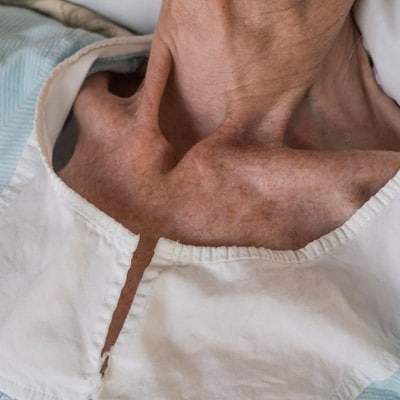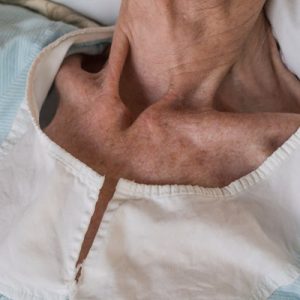As more of us live longer, the awareness of the greater complexity of need in the last days, months and years of life has increased. This, together with the projected rise in numbers of people dying over the next couple of decades, reinforces the importance that providing care and support to people with terminal illness should have in our thinking and actions.
NICE produces new draft guidelines on caring for the dying
We are reminded of this as the consultation period for the new National Institute for Health and Care Excellence (NICE) draft guidelines to improve the care of adults at the end of their lives comes to a close. End of life care is support for people who are approaching death. It helps them to live as well as possible until they die, and to die with dignity. And within end of life care there may be few areas as medically, ethically, and culturally complex as providing hydration and nutrition.
The NICE guidelines have been proposed as an alternative to the controversial Liverpool Care Pathway (LCP) phased out in 2014 amongst claims that nutrition and hydration may have been withheld, which may have had a negative impact on the dying process. The independent Neuberger review of LCP left no doubt that the practice on nutrition and hydration had not been delivered with due care of the dying person. The same issues relating to poor care at the end of life were echoed in the recent Parliamentary and Health Service Ombudsman report, Dying without dignity.
Liverpool Care pathway did not prevent poor hydration and nutrition practice
The Neuberger review judged, from the experiences presented to them, that far too often LCP advice on nutrition and hydration was not being followed. And the crucial message – that the default course of action should be that patients are supported with hydration and nutrition unless there is a strong reason not to do so – was lost.
From a medical perspective, the General Medical Council (GMC) has issued clear guidance on meeting nutrition and hydration needs in end of life care, but more is needed on supporting oral, rather than artificial, nutrition and hydration. The offer of food and drink by mouth is part of basic care (as is the offer of washing and pain relief) and must always be offered to those who are able to swallow without risk of harm such as choking or aspirating food or drink. There is no moral or legal obligation to continue to administer clinically assisted hydration or nutrition if they are having no beneficial effect. But there can be no clinical justification for denying a drink to a dying patient who wants one, unless doing so would cause them distress. Refusing food and drink is a decision for the person, not clinical staff, to make.
Getting it right every time
As well as the draft NICE guidelines, this issue has also been looked at recently in the Royal College of Nursing publication Getting it right every time which emphasises the following:
- Regular individual assessment of nutrition and hydration needs is essential
- Food and drink has physical, social, cultural and spiritual meaning in a person’s life
- Desire for food and drink may naturally decrease towards the end of life
- Additional support may be needed with some conditions where the ability to eat and drink is lost
- Inability to eat and drink and loss of appetite can be distressing for everyone involved
The RCN also provide some useful acronyms (FOOD & DRINK and COMFORT CARE) to help in delivering care.
FOOD & DRINK
- F first
- O opportunity to…
- O offer
- D drink to patient & carer
&
- D discuss & document the
- R reduced need for food & fluid based on…
- I individual assessment of
- N needs on an ongoing basis
- K keep gently checking understanding and communicating any changes to comply with the key priorities & the key principles of end of life care
COMFORT CARE
- C communication at every step
- O organisation and co-ordination of care
- M multi-agency working
- F family /carers to be included
- O oral hygiene
- R recognising dying phase
- T training appropriate to role
- C care planning
- A assessment of individual needs
- R respect and dignity
- E empathy – support realistic expectations of care and what to expect in preparing loved ones for the inevitable
Nutrition in palliative care
Even prior to the end of life stage, nutritional management in palliative care is important. People in palliative care often experience nutritional problems as their conditions progress. Nutritional issues not only impact them physically but also psychologically, and can also have an effect on those caring for them. In addition to providing nutrients, nutrition has an important social and spiritual role in the palliative stages of illness. Eating can help maintain a sense of normality in the person’s life. As food intake is also associated with health and well-being, it may evoke feelings of fear and despair in those struggling to eat and those close to them.
The nutritional objective in palliative care should be about quality of life including comfort, symptom relief and enjoyment of food. Decisions concerning nutrition should always be person-centred, individualised and open to change in line with any change in condition. Aggressive feeding may not be appropriate especially if eating and drinking cause discomfort/anxiety.
Worsening symptoms of disease – particularly those involving fatigue, dysphagia or relating to the gut can make eating more difficult. As the final phase of illness develops, appetite and ability to tolerate food will decrease, and sedatives/pain medication may further decrease inclination to eat.
Therefore, it is important that the person is screened appropriately and that one identifies what symptoms are potentially affecting their intake. Nutritional interventions range from food modification and nutritional supplements, to more intense methods such as enteral or parenteral nutrition, and these may have ethical and legal considerations.
Let’s hope that after the lessons of LCP, there is a new and determined emphasis to ensure hydration and nutrition are supported as appropriate. Both should be considered in the care of people at the last stage of their lives.
Ayela Spiro, British Nutrition Foundation – QCS Expert Nutrition Contributor






